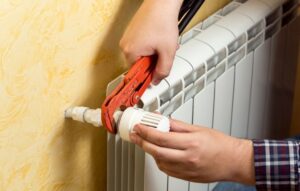Gas leaks can be deadly and pose a serious threat to homes and businesses. Gas is a highly flammable substance, and when it leaks into an enclosed space, it can quickly build up and create an explosive atmosphere. In addition to the risk of explosion, gas leaks can also lead to carbon monoxide poisoning, which can be fatal. It is important to understand the common causes, signs, and symptoms of gas leaks to prevent accidents and protect yourself and your loved ones.
Common Causes of Gas Leaks in Homes and Businesses
There are several common causes of gas leaks in homes and businesses. One of the main causes is aging gas lines and appliances. Over time, gas lines can deteriorate and develop cracks or leaks. Similarly, older appliances may have worn-out seals or connections that can lead to gas leaks. Poor installation or maintenance is another common cause of gas leaks. If gas lines or appliances are not installed correctly or are not properly maintained, they can develop leaks.
Natural disasters or weather-related damage can also cause gas leaks. Earthquakes, floods, hurricanes, and other natural disasters can damage gas lines or appliances, leading to leaks. Finally, human error or negligence can also result in gas leaks. For example, someone may accidentally damage a gas line while digging in their yard or fail to properly shut off a gas valve after completing a repair.
Signs and Symptoms of a Gas Leak
It is important to be able to recognize the signs and symptoms of a gas leak so that you can take immediate action if one occurs. One of the most common signs of a gas leak is a rotten egg or sulfur-like odor. Natural gas is odorless, but an odorant called mercaptan is added to it to make it easier to detect. If you smell this distinctive odor in your home or business, it is likely that there is a gas leak.
Another sign of a gas leak is a hissing or whistling sound near gas lines or appliances. This sound is caused by the escaping gas and should not be ignored. Additionally, if you notice dead or dying vegetation near gas lines, it could be a sign of a gas leak. Gas leaks can release chemicals into the soil that can harm plants and cause them to wither.
In addition to these signs, there are also physical symptoms that can indicate a gas leak. If you experience headaches, dizziness, nausea, or difficulty breathing, it could be a sign of carbon monoxide poisoning. Carbon monoxide is a byproduct of incomplete combustion and can be present in high concentrations during a gas leak.
What to Do if You Suspect a Gas Leak
If you suspect a gas leak in your home or business, it is important to take immediate action to protect yourself and others. The first step is to evacuate the area. Leave the building and move to a safe location away from the source of the gas leak. Once you are outside, call 911 or your gas company’s emergency line to report the leak.
While waiting for help to arrive, it is important to avoid using any electrical devices or light switches. These can create sparks that could ignite the gas and cause an explosion. It is also important not to attempt to locate or repair the leak yourself. Gas leaks should only be handled by trained professionals who have the necessary equipment and expertise.
The Importance of Regular Gas Line Maintenance
Regular inspections and maintenance can help prevent gas leaks from occurring in the first place. It is recommended to have your gas lines and appliances inspected by a licensed professional on a regular basis. They can identify any potential issues and make necessary repairs or replacements before a leak occurs.
During an inspection, the professional will check for signs of wear and tear on the gas lines and appliances. They will also ensure that all connections are secure and that there are no leaks. If any issues are found, they can be addressed immediately, reducing the risk of a gas leak.
How to Prevent Gas Leaks in Your Home or Business
In addition to regular maintenance, there are several steps you can take to prevent gas leaks in your home or business. One of the most important things you can do is to install carbon monoxide detectors and gas detectors. These devices can alert you to the presence of gas in your home or business before it becomes a serious threat.
Proper ventilation is also crucial in preventing gas leaks. Make sure that all gas appliances and equipment are properly ventilated to allow for the safe release of gases. This includes ensuring that vents and chimneys are clear of obstructions and functioning properly.
It is also important not to store flammable materials near gas lines or appliances. Flammable materials can increase the risk of a fire if a gas leak occurs. Keep these materials stored in a separate area away from any potential sources of ignition.
The Role of Gas Detectors in Gas Leak Prevention
Gas detectors play a crucial role in preventing gas leaks and protecting homes and businesses. These devices are designed to detect the presence of gas in the air and sound an alarm when levels reach a dangerous threshold. By installing gas detectors in areas where gas appliances or equipment are located, you can be alerted to a potential leak before it becomes a serious threat.
Gas detectors should be installed according to the manufacturer’s instructions and regularly tested to ensure they are functioning properly. It is also important to replace the batteries as needed and replace the detector itself according to the manufacturer’s recommended schedule.
Understanding Gas Leak Emergencies and Response Protocols
Gas leak emergencies require immediate action and response. If you suspect a gas leak, it is important to follow emergency response protocols to protect yourself and others. This includes evacuating the area and calling 911 or your gas company’s emergency line to report the leak.
When evacuating, it is important to move to a safe location away from the source of the gas leak. Do not use any electrical devices or light switches, as these can create sparks that could ignite the gas. It is also important not to attempt to locate or repair the leak yourself. Leave that to trained professionals who have the necessary equipment and expertise.
The Risks of Ignoring Gas Leaks and the Consequences of Inaction
Ignoring gas leaks can have serious consequences. Gas leaks can lead to explosions, fires, and carbon monoxide poisoning, all of which can result in serious injury or death. In addition to the risk to human life, gas leaks can also cause property damage and financial loss.
Explosions and fires caused by gas leaks can destroy buildings and belongings, leaving individuals and businesses with significant repair and replacement costs. Carbon monoxide poisoning can also cause long-term health problems for those exposed to high levels of the gas.
The Importance of Proper Gas Leak Cleanup and Remediation
After a gas leak has been addressed, it is important to properly clean up and remediate the affected area. Gas leaks can leave behind harmful residue and contaminants that can pose ongoing health risks if not properly addressed. Hiring a professional with experience in gas leak cleanup and remediation is crucial to ensure that all traces of the gas are removed and that the area is safe for occupancy.
During the cleanup process, professionals will use specialized equipment and techniques to remove any remaining gas residue. They will also test the air quality to ensure that there are no lingering traces of gas. Once the cleanup is complete, repairs can be made to any damaged gas lines or appliances.
How Do Gas Leaks Compare to Electric Shock Hazards in Terms of Safety Risks?
When comparing gas leaks to electric shock hazards safety tips, it’s important to recognize that both pose serious safety risks. Gas leaks can lead to fires and explosions, while electric shock hazards safety tips can prevent potential electrocution. Both require careful attention and proper safety precautions to avoid dangerous situations.
Staying Safe and Informed About Gas Leaks
Gas leaks are a serious threat to homes and businesses, but by staying informed about the common causes, signs, and symptoms of gas leaks, you can take steps to prevent accidents and stay safe. Regular maintenance, the installation of gas detectors, and following emergency response protocols are all important in preventing and addressing gas leaks. By taking these precautions and being proactive, you can protect yourself, your loved ones, and your property from the dangers of gas leaks. When it comes to safety, knowing how to identify gas leaks is crucial. Be alert to unusual odors, such as a rotten egg smell, which is often added to natural gas for detection. Additionally, listen for hissing or whistling sounds near gas lines, and watch for any dead vegetation or bubbles in standing water around gas pipes, as these can also indicate a leak.



